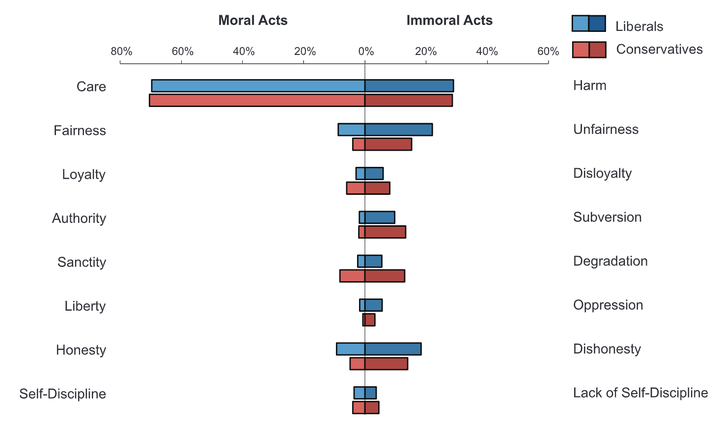Morality and Moralization
 Figure 2 from Hofmann et al., 2014
Figure 2 from Hofmann et al., 2014Moral and immoral events are common and play an important role in people’s emotional lives and in their sense of wellbeing and belonging (Hofman, Wisneski, Brandt & Skitka, 2014). How do people come to hold onto their moral beliefs in the first place and why are they such a powerful factor? We have studied this question by focusing on moralization, which is when an attitude, idea, or behavior acquires moral relevance over time (Brandt, Wisneski, & Skitka, 2015), and by trying to understand the precise mechanisms linking disgust with harsher moral judgments (Wagemans et al., 2018).
Key Project Publications
- Curry, O. S. Alfano, M., Brandt, M. J., & Pelican, C. (in press). Moral molecules: Morality as a combinatorial system. Review of Philosophy and Psychology. pdf
- Brandt, M. J., Wisneski, D., & Skitka, L. (2015) Moralization and the 2012 U.S. Presidential Election campaign. Journal of Social and Political Psychology, 3, 211-237. doi | pdf | code
- Brandt, M. J., & Reyna, C. (2011). The chain of being: A hierarchy of morality. Perspectives on Psychological Science, 6, 428-446. doi | pdf
- Hofmann, W., Brandt, M. J., Wisneski, D. C., Rockenbach, B., & Skitka, L. J. (2018). Moral punishment in everyday life. Personality and Social Psychology Bulletin, 44, 1697-1711. doi | pdf | code | data
- Hofmann, W., Wisneski, D. C., Brandt, M. J., & Skitka, L. J. (2014) Morality in everyday life. Science, 345, 1340-1343. doi | pdf | code | data
- Kodapanakkal, R.I., Brandt, M.J., Kogler, C., & van Beest, I., (2020). Self-interest and data protection drive the adoption and moral acceptability of big data technologies: A conjoint analysis approach. Computers in Human Behavior, 108, 106303. doi | pdf
- Kodapanakkal, R. I., Brandt, M. J., Kogler, C., & van Beest, I. (2022). Moral frames are persuasive and moralize attitudes; nonmoral frames are persuasive and de-moralize attitudes. Psychological Science, 33, 433-449. doi | pdf | code | data
- Kodapanakkal, R. I., Brandt, M. J., Kogler, C., & van Beest, I. (2022). Moral relevance varies due to inter-individual and intra-individual differences across big data technology domains. European Journal of Social Psychology, 52, 46-70. doi | pdf | code | data
- Skitka, L. J., Wisneski, D. C., & Brandt, M. J. (2018). Attitude moralization: Probably not intuitive or rooted in perceptions of harm. Current Directions in Psychological Science, 27, 9-13. doi | pdf
- Turner-Zwinkels, F. M., Sibley, C. G., Johnson, B. B., & Brandt, M. J. (2021). Conservatives moral foundations are more densely connected than liberals’ moral foundations. Personality and Social Psychology Bulletin, 47, 167-184. doi | pdf
- Voelkel, J. G., & Brandt, M. J. (2019). The effect of ideological identification on the endorsement of moral values depends on the target group. Personality and Social Psychology Bulletin, 45, 851-863. doi | pdf | code | data
- Wagemans, F. M. A., Brandt, M. J., & Zeelenberg, M. (2018). Disgust sensitivity is primarily associated with purity-based moral judgments. Emotion, 18, 277-289. doi | pdf | code | data